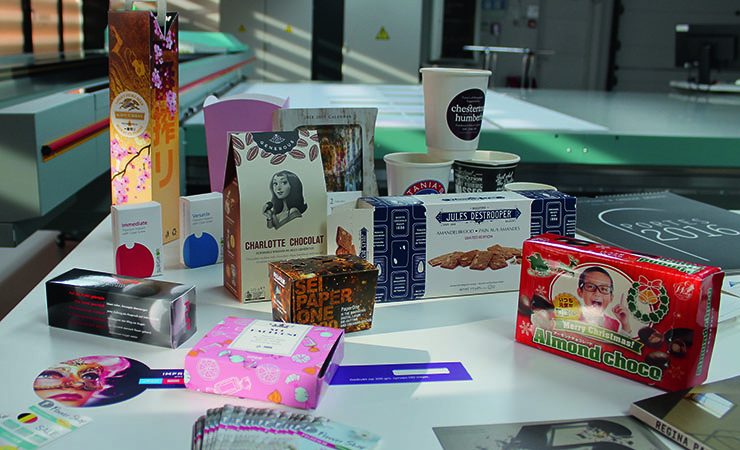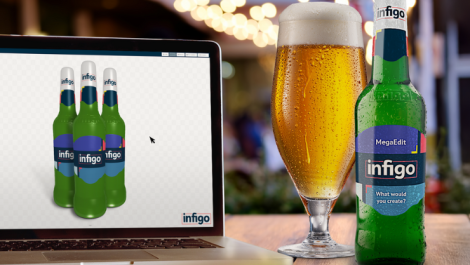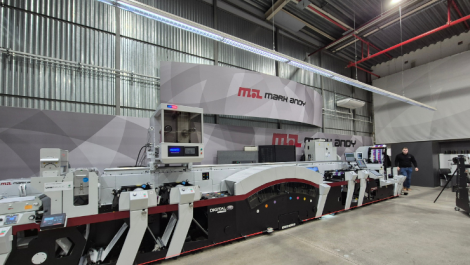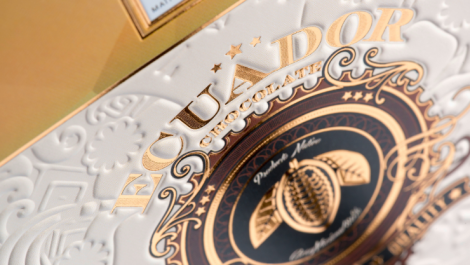The green characteristics of carton board make it a popular choice with brands as they move towards creating more sustainable packaging. Combined with the efficiencies of digital printing, folding cartons are on the rise. By Neel Madsen.
Carton board is renewable, biodegradable and recyclable so providing the inks used to print folding carton packaging are also eco-friendly, there are significant sustainability benefits to be had for brands. Digital carton presses offer fast delivery, no minimum order quantities and just in time delivery – all aspects that help cut down on waste. It’s a match made in heaven.
Tony Hitchin, general manager of Pro Carton, the European Association of Carton and Cartonboard Manufacturers, said, ‘Digital printing of folding cartons is growing in popularity, although still accounts for a relatively low share of the total carton market. The overall carton market has been boosted by the concerns about less sustainable packaging materials with many brands and retailers looking to move to paper-based packaging whether that be digitally or conventionally printed.’
The association’s European Consumer Packaging Perceptions study, which polled 7000 consumers across seven countries – France, Germany, Italy, Poland, Spain, Turkey and the United Kingdom, revealed that the environmental impact of a product’s packaging now affects the purchasing decisions of 75% of consumers. Mr Hitchin commented, ‘The strength of consumer sentiment means that cartons are widely considered as the packaging material of choice for consumers and
manufacturers alike.’
Executive director of Van Genechten Packaging, which won Carton of the Year 2018, Frederic de Somer, said increasing the share of reusable packaging, choosing renewable packaging materials and giving more and clear communication to consumers are key factors in designing packaging that appeals to consumers today. ‘Consumers really appreciate packaging that is recyclable and from a renewable source, like folding cartons,’ he said, adding, ‘Sustainability is a challenge that is high on every manufacturer’s agenda. It requires continuous effort, along with new, creative ways of thinking.’
He concluded, ‘Folding cartons deliver benefits generated across our customers’ entire supply chain: from keeping their products safe and optimising shelf-impact, to protecting our precious environment. No wonder we are seeing more brand owners making the switch to folding cartons.’
Global ambitions
The HP Indigo 30000 digital press has been producing folding cartons since 2013 when the first machine went into MPS in New York. It has a 75cm sheetfed format and prints in seven colours, most often with inline coating.
Sustainability champions Transcend Packaging won the Welsh Start-Up Business of the Year Award 2018 and has become a regular on national television and radio as part of the anti-plastic packaging debate. The company sees digital as the way to bring sustainable packaging to companies around the world.
The new start-up has installed the HP Indigo 30000 with inline Tresu iCoat 30000 at its facility in Ystrad Mynach, from where it is producing folding cartons and promoting plastic-free packaging. Its declared vision is ‘to be the global leader in sustainable packaging’ and it understands the need to be able to offer just in time delivery and allowing brands to order ‘what they need, when they need it.’
Jason Short, Transcend’s business development director, said, ‘Digital is playing a big part in our future strategy. The market is showing signs of moving towards digital print and all it has to offer. Speed to market and hitting launch dates for brand owners become much easier and shorter with a digital press.’

Pro Carton’s Tony Hitchin said that many brands and retailers are looking to move to paper-based packaging
Web-to-pack
Heidelberg’s Primefire 106 press is catching on around the world. In China, the press manufacturer has worked with Xianjunlong Colour Printing, based in Shenzhen, to launch a cloud-based web-to-pack platform, named ‘boxuni’. The Chinese company is using its Primefire to set up this new business model to supply customised folding cartons on demand.
As the first boxuni production partner, Xianjunlong has implemented a fully integrated web-to-pack production line – from cloud-based online platform to printing and post-press operations.
‘It is the first time that we’re working together with a customer to invest in a new business model, which will drive further growth in the packaging market,’ said professor Ulrich Hermann, management board member and chief digital officer of Heidelberg. ‘We are intending to generate added value for the various industry stakeholders by creating a digital ecosystem. And by investing in a Heidelberg Primefire 106, Xianjunlong is underlining the importance of our industrial digital printing system for implementing new, data-driven business models.’
‘We’re expecting the boxuni web-to-pack platform to revolutionise China’s packaging market. In the future, designers, print buyers and printers will all benefit from a highly automated, standardised process that will ultimately eliminate the need for correction cycles and coordination processes. We’ll use this digital business model to ensure the Primefire is used to its full capacity on a cost-effective basis,’ added Mr Zhuang, Xianjunlong colour printing management team member.
Recognition
Fujifilm introduced the third generation of its established Jet Press printer last year. The new B2 sheetfed 750S machine can be equipped with a folding carton option to accommodate 600 micron board, which takes it into packaging territory.
Its water-based Vividia inks have been tested to meet food safety regulations, including the Swiss Ordinance and EU Reg 1935/2004, and are approved for non-food contact primary packaging. As the sheets are pre-coated to optimise and control dot formation, the ink does not sink into the substrate, which means waste can be recycled using normal deinking processes.
The Jet Press 750S has been recognised for its innovative design, winning both the Red Dot and iF Design awards 2019. This was followed by another commendation as the press also won digital press of the year in the ‘Cut sheet colour B2(+)’ category at the EDP Association awards.
‘Building on what Fujifilm had already created in the Jet Press 720S, the Jet Press 750S has set a new standard in B2 inkjet quality, reliability and productivity,’ said Taro Aoki, head of digital press solutions, Fujifilm Graphic Systems EMEA. ‘Already recognised this year with two prestigious awards for its sleek and user-friendly design, we’re delighted that the industry-leading technology under the covers has now, deservedly, been recognised as well. The Jet Press is one of the best examples of Fujifilm’s unrivalled ability to bring together its own proprietary ink, printhead technologies and image processing technology to push the boundaries of what is possible and raise the bar for digital print quality and performance to extraordinary heights.’
More options
Xerox and Xeikon have been on the market with carton solutions for a number of years, with installations at traditional carton printing companies, which are combining digital with their conventional production. Bobst’s digital division Mouvent has sold one of its digital narrow web presses for folding carton production, but no details have been revealed. The Xanté’s Excelagraphix 4800 wide format inkjet printer is a smaller option for producing cartons in ultra short runs.
And there are more presses in development. Koenig & Bauer is now working with Durst Phototechnik in both cartons and corrugated. The first project will be the manufacturing of the VariJET press for digital folding cartons, which is promised to be commercially available in time for drupa 2020. The press was first introduced in 2016 and it has recently won the iF Design Award and was described by the judges as ‘complex
and iconic.’
‘With our modern press design, we are setting not only technical, but also visual standards,’ said Dagmar Ringel, head of corporate communication and marketing at Koenig & Bauer. ‘The iF Design Award strengthens us in our conviction that we are on the right track.’






